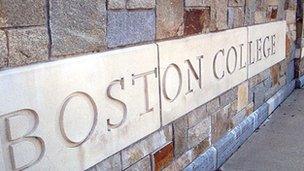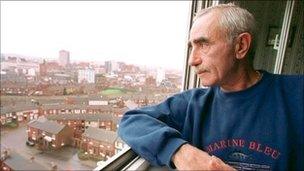Boston College defends role in fighting tapes action
- Published

The tapes are being held at Boston College
Boston College has defended its role in fighting legal action to obtain details of interviews carried out with former paramilitaries.
The transcripts are currently in the possession of a US federal judge, as they have been kept at the college.
The latest hearing in the court action will take place later on Tuesday.
Jack Dunn from the college says he suspects the interviews are wanted in connection with dissident republican activity rather than past events.
"There's been a lot of questions in Ireland as to whether this was politically motivated. It very well may be," he said.
Mr Dunn said the college had not had any discussions with the PSNI about the tapes - but it had done everything in its power to avoid handing them over.
"Nobody wanted to see that happen. I don't think anybody anticipated it, in light of the Good Friday Agreement," he said.
"There seems to be a lack of understanding of the legal process in the United States of what it means to receive a federal subpoena from the US Attorney's office."

Brendan Hughes was among former IRA members who gave interviews to Boston College
He said the documents had been sealed and the college did not know if it was, in fact, the PSNI that was requesting the interviews.
The PSNI has confirmed that its Crime Operation Branch is seeking the transcripts.
Last year, the PSNI began a legal bid to gain access to the interviews with former republicans and loyalists held by the college.
At the time, it was believed they were being sought by detectives investigating cases of people murdered and secretly buried by the IRA.
At the heart of the case is the 1972 IRA murder of Jean McConville.
On Tuesday, a PSNI spokesperson told the BBC that legislation providing anonymity to anyone passing information on the disappeared would remain only so far as the commission created to locate their bodies was concerned.
They said that if other information were to come to light, the PSNI was entitled to investigate in the normal way.
The college has already turned over tapes of interviews given by Brendan Hughes, a former IRA member who died in 2008.
Mr Dunn said the only other material handed over to the US Department of Justice was that of former IRA member Dolours Price, following a court ruling.
It is now concentrating on appealing against handing over tapes with 24 other interviewees.
An appeal against the interviews being handed over was made by journalist and writer Ed Maloney who was the director of the so-called Belfast Project for Boston College and republican researcher Anthony McIntyre.
The Belfast Project took place for five years from 2001 and involved academics, historians and journalists conducting interviews with former republicans and loyalists about their activities during the Troubles.
The interviewees were promised by the researchers that their accounts would remain confidential until after their deaths.
- Published15 January 2012
- Published13 January 2012
- Published13 May 2011